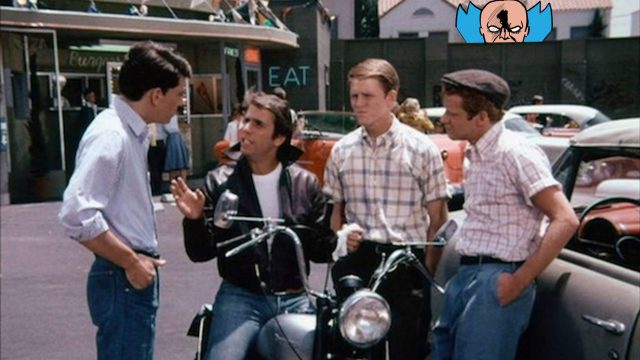It turns out that Happy Days exists because Ron Howard had a low draft number. There were no longer student deferrals, so he couldn’t go back to film school, but he’d read that you could get a deferral if a certain number of people relied on you for their employment. Howard hadn’t particularly planned to act anymore, from what I can tell, but he also didn’t believe he could stay out of Vietnam any other way. Which means that Ron Howard’s draft number gave us Henry Winkler, Robin Williams, Laverne & Shirley, and on and on. It’s not really surprising, in a way; Hollywood is an insular town, and all sorts of things happen that way. Ron Howard is merely a single focal point.
We exemplify this in the Kevin Bacon Game, but if Bacon himself is actually the center of a real-life hub like that, I don’t know about it. Film, sure. I’m a champ at Six Degrees of Kevin Bacon. That’s not the kind of thing we’re talking about here, however. We’re talking about real-world moments that led to other real-world things. There are plenty of examples there, like the Happy Days one above. If Ron Howard could think of a different way of avoiding military service, might we have avoided Joanie Loves Chachi?
Let us also now talk about one of the great publicity campaigns of all time. Supposedly, David O. Selznick spent a hundred grand on an open casting call for Scarlett O’Hara. That’s nearly $2 million in today’s money. Obviously, this did not end up producing a Scarlett. On the other hand, Susan Hayward made the switch from modeling to acting as part of the search and later won an Oscar. Margaret Tallichet had been working in the publicity department for Paramount, where she made friends with Carole Lombard. Who got her a screen test. She was initially cast as Careen O’Hara, and didn’t keep the role, and didn’t have much of a career, but she ended up marrying William Wyler and having five children with him.
Now, everyone knows about the 1964 New York World’s Fair. And most people, I’m sure, know that Walt Disney tested a lot of things that would eventually go on to shape Disneyland. Probably it’s not exactly unknown that Pepsi was the original World’s Fair sponsor of it’s a small world. (No capitalization in the official name!) But it turns out that Joan Crawford, who was on the board at the time, ran into Walt at a party and told him that someone at the company had told someone at Pepsi that they couldn’t do a ride for Pepsi for the fair, and she demanded that Walt explain why not. One assumes it was not because Bette Davis was secretly manning the phones that day.
Hollywood’s a company town. It always has been. In that sense, it’s not surprising that people will leave their influence in these ways. And of course that’s without getting into the whole nepotism thing—Ron Howard has employed quite a lot of his family over the years, and he wouldn’t have been able to do that if he’d died in Vietnam. But that’s also not what we’re talking about here; we’re talking about strange little moments. If the Gone With the Wind casting had led to an actual casting of Scarlett, that might actually have changed it so it wasn’t what we were talking about here. It’s only because it was unsuccessful that its successes elsewhere are surprising.
I rely currently on fewer of you than Ron Howard kept employed; raise that number by supporting my Patreon or Ko-fi! Special thanks also to Anthony Pizzo for subtly altering today’s article image!

